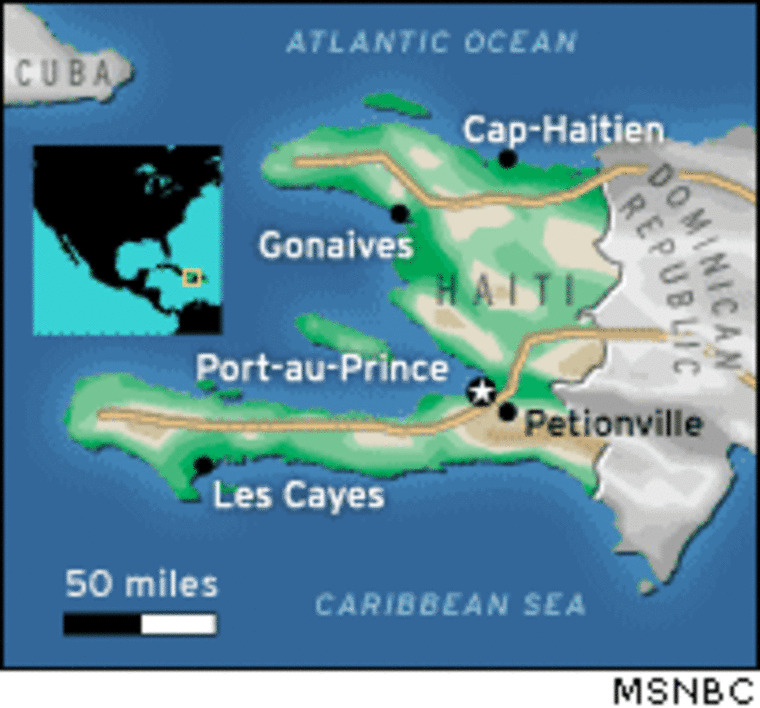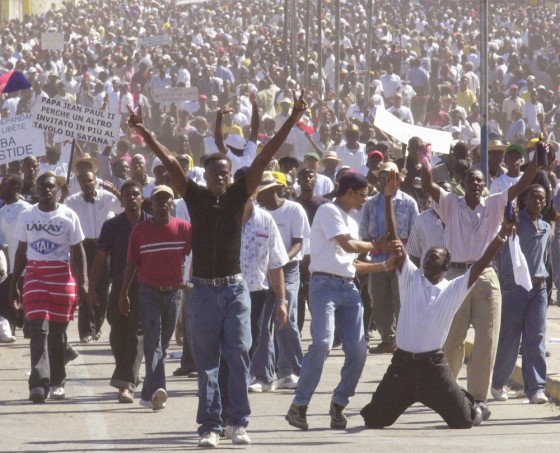Bloody clashes between protesters and police marred celebrations on Haiti’s 200th anniversary of independence Thursday as embattled President Jean-Bertrand Aristide faced growing unrest in his shattered country.
Underscoring deepening political divisions, more than 15,000 government supporters rallied outside the National Palace in the capital while about 5,000 presidential opponents marched toward downtown, shouting “Down with Aristide!”
Shots were fired at the South African security team accompanying visiting dignitary President Thabo Mbeki, but Mbeki was never in danger, officials said on Friday.
Marred celebrations
As Aristide led celebrations of the country’s 200th anniversary of independence from France, speaking to a large crowd gathered at the National Palace, thousands of protesters poured into the streets and tried to march toward the palace, witnesses and local media said.

Police used tear gas and fired into the air to hold them back. Many of the demonstrators reacted angrily, setting up numerous road blocks around the city with burning tires, vehicles, car parts and rocks, witnesses said. At least two demonstrators were wounded by bullets and six were hit by rocks.
“Today is a day for celebrating freedom,” said Rodney William, 33, a business owner. “But for us, that means freedom from slavery and freedom from Aristide.”
Bittersweet remembrance
The bicentennial comes as a bittersweet remembrance for a country that triumphed over slavery and colonialism two centuries ago only to become the poorest nation in the Western Hemisphere, struggling to neutralize nagging political and economic troubles.
Its history has been plagued by violence and, in recent times, by tensions between Aristide and his political opponents, who accuse him and his government of corruption and mismanagement and of trampling on democratic rights.
In recent months, thousands have taken to the streets almost daily to protest against Aristide. Several dozen people have died in political violence since mid-September.
Aristide, like many leaders before him, spoke wistfully of the future Thursday instead of the past. His beleaguered administration has been rendered ineffective with a lingering political impasse and shaky international support. He is barred from running for a third term.
“It was 1804 that was the stinging bee but 2004 is sure to be the year of honey,” Aristide smiled as he rallied a frantic crowd of supporters Thursday.
The government has come under fire for the lavish celebrations including galas, New Year fireworks and the dedication of a monument to Haiti’s forefathers, that reportedly cost $15 million.
Mbeki's controversial visit
South African police spokesman Selby Bokaba said a helicopter belonging to Mbeki’s security detail came under fire as it was flying over the port city of Gonaives ahead of celebrations of Haiti’s 200th anniversary.
“The president and those in his immediate party were nowhere in the area where the shooting took place, Mbeki’s spokesman, Bheki Khumalo, told the state broadcaster amid mounting domestic criticism over Mbeki’s visit to the Caribbean island.
Mbeki has been criticized at home for travelling to Haiti, where Aristide has been accused by his political opponents of failing to deliver on promises to bring democracy to the impoverished island.
South Africa donated 10 million rand ($1.4 million U.S. dollars) to help fund the celebration of Haiti’s independence from France in 1804, which in a speech Mbeki called an inspiration for Africa’s own struggle against colonialism.
Mbeki, whose foreign policy has been driven by a strong vision of an African renaissance, said his trip to Haiti was an important sign of solidarity with the world’s first black-led republic and a step towards cementing ties between Africa and communities of the African diaspora.
Commentator Peter Fabricius, writing in the Friday issue of Johannesburg’s Star newspaper, said Mbeki had chosen the wrong country to praise as a model for black liberation.
“The model which Africa needs today is not one of heroic revolution and liberation. We have had plenty of those. It is models of what ought to happen after liberation -- the slow, mundane and patient construction of a viable state -- that are rather scarce.”
